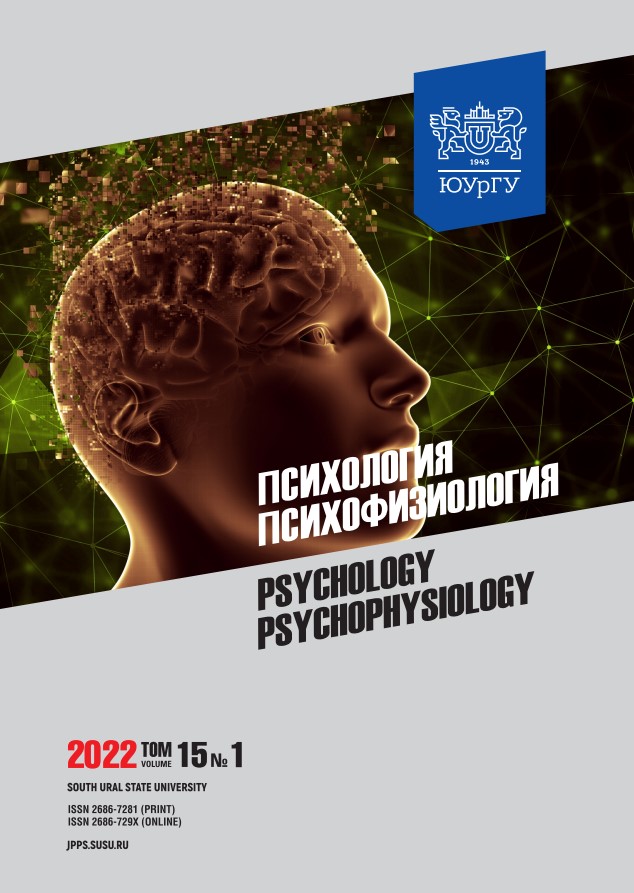Social anxiety and psychological climate as indicators of vitality in students of different education fields
Abstract
Introduction.The paper presents certain social and psychological aspects of vitality, which received little attention in scientific publications. The paper aims to identify the relationship between vitality, anxiety, and psychological climate in students of different education fields. Materials and methods: Standard methods were used for the purpose of the study, including the E.A. Rylskaya human vitality test, O.A. Sagalakova and D.V. Truevtsev social anxiety test, A.F. Fidler psychological climate in a group test.
The study involved last-year students of South Ural State Humanitarian Pedagogical University (n = 69) and Ural State University of Physical Education (n = 35), including 27 male and 77 female students. Data processing was performed with correlation analysis and SPSS Statistics v. 17.0. Results. In sports university students, a relatively low alteration of general vitality and general social anxiety values was recorded; in pedagogical students, adaptation skills changed insignificantly. The mean values of general vitality in both groups corresponded to below average. The data of certain scales (social anxiety in the situation of being the center of attention, post-situational ruminations, and restraint in expressing emotions due to fear of rejection) of the social anxiety test reflect the average significance level for the reasons of these anxiety types regardless of students’ education fields. In both groups, psychological climate was characterized as predominantly positive. However, negative relationships were found between adaptation skills and the situation of being the center of attention/fear of being criticized. The rest correlations were principally different indicating a high variability of correlational structures of vitality in students of different education fields. Conclusion. An analysis of the structure of human vitality should take into account its relationships with socio-psychological components and can be used as a basis for developing and maintaining vitality in university students.
Downloads
References
2. Krasnova-Goleva V.V., Kholmogorova A.B. Social Anxiety and Student Disadaptation. Psikhologicheskaya nauka i obrazovanie psyedu.ru = Psychological Science and Education psy-edu.ru. 2011;3(1). (in Russ.). Available at: https://psyjournals.ru/psyedu_ru/2011/n1/39944.shtml (accessed 14.12.2021)
3. Korytko I.D. Psychological factors of social anxiety in students. Nauchnye trudy Moskovskogo gumanitarnogo universiteta = Scientific works of the Moscow University for the Humanities. 2021;1:13–17. (in Russ.). DOI: https://doi.org/10.17805/trudy.2021.1.2
4. Rylskaya E.A., Moshkina L.D. Resilience in the Integral Individuality of Students. Psikhologiya. Psikhofiziologiya = Psychology. Psychophysiology. 2021;14(4):24–36. (in Russ.). DOI: https://doi.org/10.14529/jpps210403
5. Rylskaya E.A. Test “Human system capability”: working out and psychometrical characteristics. Sotsium i vlast = Society and Power. 2016;1(57):25–30. (in Russ.).
6. Fetiskin N.P., Kozlov V.V., Manuilov G.M. Methodology for assessing the psychological atmosphere in the team (according to A.F. Fidler). Moscow, Publ. house of the Institute of Psycho-therapy. 2002:190–191. (in Russ.).
7. Sagalakova O.A., Truevtsev D.V. Questionnaire of social anxiety and sociophobia. Meditsinskaya psikhologiya v Rossii: elektronnyy nauchnyy zhurnal = Medical psychology in Russia: electronic scientific journal. 2012;4(15). Available at: http://www.medpsy.ru/mprj/archiv_global/2012_4_15/nomer/nomer19.php (accessed 19.12.2021). (in Russ.).
8. Shishlyannikova L.M. Application of correlation analysis in psychology. Psikhologicheskaya nauka i obrazovanie = Psychological science and education. 2009;1:98–107. (in Russ.).
9. Baiguzhin P.A. Hygienic estimation of intensity brainwork of students in the situation of testing of theoretical readiness. Vestnik Yuzhno-Uralskogo gosudarstvennogo universiteta. Seriya: Obrazovanie, zdravookhranenie, fizicheskaya kultura = Bulletin of South Ural State University. Series “Education, Healthcare, Physical Education. 2011;39(256):16–18. (in Russ.).
10. Makunina O.A., Bykov E.V., Kolomiets O.I., Yakubovskaya I.A. The regime of students day in terms of complex influence of mental and physical loads. Nauchno-sportivnyy vestnik Urala i Sibiri = Ural and Siberia bulletin of sports science. 2018;1(17):50–55. (in Russ.).
11. Makunina O.A., Bykov E.V., Kharina I.F., Svetlakova M.V. Social adaptation of sporting students: psycho-physiological health tests and analysis. Teoriya i praktika fizicheskoy kultury = Theory and practice of physical culture. 2021;11:75–76. (in Russ.).
12. Shibkova D.Z., Baiguzhin P.A., Erlikh V.V., Batueva A.E., Sabiryanova E.S. Selection and biomedical support for gifted children simultaneously involved in education and sports. Sci-ence for Education Today. 2020;10(5):196–210. (in Russ.). DOI: https://doi.org/10.15293/2658-6762.2005.11.
13. Norton P.J., Burns J.A., Hope D.A. et al. Generalization of social anxiety to sporting and athletic situations: Gender, sports involvement, and parental pressure. Depression and anxiety. 2000;12(4):193–202. DOI: https://doi.org/10.1002/1520-6394.
14. Manuilov G.V., Gorelova G.G., Yashchenko E.F. The Features of Empathy and Reflection in a Person at Different Stages of Education. Psikhologiya. Psikhofiziologiya = Psychology. Psychophysiology. 2020;13(1):5–13. (in Russ.). DOI: https://doi.org/10.14529/jpps200101
15. Gerasimova O.Yu., Semchenko L.N. Anxiety Disorders among Medical Students. Psikhologiya. Psikhofiziologiya = Psychology. Psychophysiology. 2020;13(4):30–38. (in Russ.). DOI: https://doi.org/10.14529/jpps200404
16. Kraft J.D., Grant D.M., White E.J. et al. Cognitive mechanisms influence the relationship between social anxiety and depression among college students. Journal of American college health. 2021;69(3):245–251. DOI: https://doi.org/10.1080/07448481.2019.1661844.
17. Shabanova T.L., Tarabakina L.V. Study of emotional maturity among students of a pedagogical university. Vestnik Mininskogo universiteta =Bulletin of the Minin University. 2018;6(1):13. (in Russ.). DOI: https://doi.org/10.26795/2307-1281-2018-6-1-13.
18. Baiguzhin P.A., Baiguzhina O.V., Pracheva A.A. The structure of aggression of female students of a pedagogical university. Sovremennye issledovaniya sotsialnykh problem (elektronnyy nauchnyy zhurnal) = Modern studies of social problems (electronic scientific journal). 2014;6:6. (in Russ.). DOI: https://doi.org/10.12731/2218-7405-2014-6-6.
19. Zausenko I.V., Ozerova E.V. The relationship of anxiety and motivation to learn from students. Pedagogicheskoe obrazovanie v Rossii = Pedagogical Education in Russia. 2019;5:90–96. (in Russ.). DOI: https://doi.org/10.26170/po19-05-13
20. Borodina K.M. Social anxiety as a factor in reducing student performance. Regionalnyy vestnik = Regional Bulletin. 2019;22(37):7–8. (in Russ.).
21. Akopov G.V., Akopyan L.S., Timoshkin S.I. Features of emotional profile and content of social ears of student youth. Izvestiya Samarskogo nauchnogo tsentra Rossiyskoy akademii nauk. Sotsialnye, gumanitarnye, mediko-biologicheskie nauki = Izvestiya of the Samara Russian Acad-emy of Sciences scientific center. Social, humanitarian, medicobiological sciences. 2019;21(69):10–15. (in Russ.).
References on translit
-Copyright (c) 2022 Psychology. Psychophysiology

This work is licensed under a Creative Commons Attribution-NonCommercial-NoDerivatives 4.0 International License.



